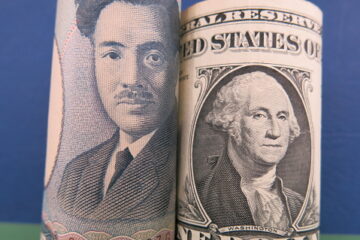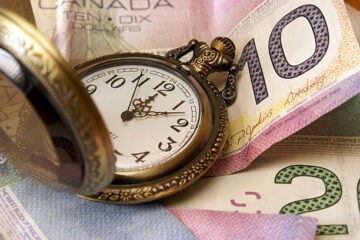Investors have had a rough year. Stocks came into 2024 riding high after back-to-back years of S&P 500 returns above 20%. It’s been a much different story in 2025.
The stock market’s valuation was arguably stretched too far by last year’s gains, and pricing them to perfection set the stage for a reckoning amid growing recession worries. Sticky inflation and recent job losses have raised the risk of stagflation, and the latest news out of the White House on tariffs has done little to ease investor concerns.
The so-called “Liberation Day” tariff announcement on April 2 included widespread taxes on global imports ranging from 10% up to 40% or more for many trading partners, particularly in Asia. An additional 34% tariff on China lifted taxes on imports from there to 54%, potentially sparking price increases on everything from apparel to electronics.
Related: Veteran fund manager who forecast S&P 500 crash unveils surprising update
The tariff news wasn’t unexpected, given they were a cornerstone of President Trump’s election campaign. Their size, however, was unsettling, derailing hopes that pre-announcement negotiations would tame them.
Following the announcement, the S&P 500 tumbled 4%, sending shock waves. Global markets also staggered, as the NIKKEI 225 Index slumped 5%.
💵💰Don’t miss the move: Subscribe to TheStreet’s free daily newsletter 💰💵
The hit to stocks likely isn’t lost on Treasury Secretary Scott Bessent. Bessent is a stock market veteran who trained under the legendary hedge-fund manager Stanley Druckenmiller, including during a stint at Soros Fund Management. Bessent went on to run his own hedge fund, Key Square Group before Trump appointed him to run the Treasury in 2025.
Following Trump’s tariff announcement, Bessent sent a stern warning people should consider.
Scott Bessent, Treasury Secretary, had a blunt message for global trade partners following “Liberation Day.”
Tariffs hit at pivotal time for the U.S. economy
There are a lot of reasons behind the stock market’s year-to-date decline, including:
Sticky inflation.Job market uncertaintySlowing economic activityArguably rich stock valuations.
The Federal Reserve’s hawkish monetary policy in 2022 and 2023 caused inflation to fall from above 8% to below 2.5% in 2024.
Related: Billionaire Michael Bloomberg sends hard-nosed message on economy
However, higher interest rates have capped economic growth, and there’s been a steady drumbeat of layoffs lately. The unemployment rate has creeped up to 4.1% from 3.5% as recently as 2023. And 172,000 lost their job in February, the most in that month since the Great Recession, according to Challenger, Gray, & Christmas.
There’s also mounting evidence that the Fed’s progress battling inflation has stalled. In February, the Consumer Price Index clocked in at 2.8%, up from 2.4% last September when job losses forced the Fed to cut interest rates.
The uptick in inflation is taxing consumer budgets, making them reconsider purchases and retrench. Unsurprisingly, that’s impacting recent economic data, which is raising red flags that a recession may loom.
Consumer confidence data reveal recession risk is rising. The Conference Board’s Consumer Expectations Index fell to 65 in February, below the 80 level that historically warns of recessions.
Those confidence figures won’t be helped by the “Liberation Day” tariffs.
U.S. import tariffs will be widespread and big
There’s considerable debate raging on the pros and cons associated with tariffs.
Related: Jim Cramer offers blunt one-word reaction to 20% tariffs
Proponents believe tariffs will wrestle manufacturing back to America, kicking off a resurgence in an industry that has long suffered because of free trade agreements.
Opponents believe tariffs are a misguided gambit likely to backfire. They often cite the failed Smoot-Hawley Tariff Act, signed into law in June 1930. That Act, which raised taxes on many imports to 20%, is widely believed to have worsened the Great Depression. The Tariff of 1828 (Tariff of Abominations) contributed to Andrew Jackson winning the Presidential election in 1928 because he opposed it.
Tariffs this time around could be even bigger. The tariffs announced on “Liberation Day” include a broad-based baseline 10% tariff on all imports. However, individual trading partners face much stiffer taxes. For example, China, Vietnam, and Japan face tariffs of 54%, 46%, and 24%, respectively.
Scott Bessent sends stern message to trading partners
The impact of tariff uncertainty isn’t lost on Bessent, who delivered a firm message to global leaders in a bid to head off a potential trade war.
“I would advise none of the countries to panic. I wouldn’t try to retaliate because as long as you don’t retaliate, this is the high end of the number,” said Bessent in a Bloomberg interview.
He also attempted to shore up market participants.
“I think the market could have certainty that this is the number barring retaliation,” said Bessent. “So, we’ve got a ceiling, and then we can see if there’s a different floor.”
Unfortunately, Bessent refuted the idea that negotiations may mean tariffs change before they go into effect.
“It’s going to be up to President Trump to see what he wants to do,” said Bessent. “I think the mindset might be to let things settle for a while.”
Those hoping Bessent’s market experience will help influence changes will likely be disappointed.
“I’m not part of the negotiation,” said Bessent. “I’m sure there gonna be a lot of calls, I just don’t know if there gonna be negotiations.”
Related: Veteran fund manager unveils eye-popping S&P 500 forecast


